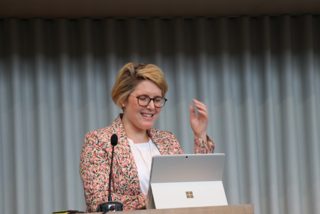
Isabel Yglesias Julià, Head of the liaison office of the Spanish business association Confederación Española de Organizaciones Empresariales © EESC
The EU needs a strong medium- and long-term competitiveness agenda
General elections are due in Spain. How will the elections affect the Spanish EU Council Presidency in the second half of 2023?
The call for early elections by prime minister Pedro Sánchez took all actors by surprise. Nevertheless, we know that ministries involved have already gone through a thorough preparation ahead of the Spanish Presidency and therefore we are convinced that the smooth negotiation of main files in the Council is ensured. Nevertheless, it is still unclear how will the presidency push for the political priorities that had already been announced, for example in the social field, or whether they will be nuanced or re-examined.
In this new context, we hope that the new government will be fully in place right after the summer, and that it can make the most out of the second half of the presidency. In any case, the very interesting agenda of informal meetings of ministers across Spain will be maintained and, as it has been repeatedly highlighted by our government, the Spanish Presidency is considered a “national project” that lies on the strong engagement of the civil society. Therefore, early elections should not directly affect the management of the legislative dossiers that will devolve upon the presidential term nor the success of all what has already been successfully planned.
What is the economic policy programme of the Spanish Council Presidency?
The Spanish Presidency has high ambitions in the economic field, as it will have to lead the negotiations of the revision of the economic governance framework and Multiannual Financial Framework (MFF), with the reform of the fiscal rules and tax harmonisation, Union’s own resources, and files such as sustainable finance. The government frames it in the debate of how to shape the European model for the new digital economy (closing relevant files such as the AI act). And recently, they have welcomed the debate on boosting competitiveness and strategic autonomy. They will also focus on deepening relations with Latin America and the Caribbean.
What are your organisation’s three top priorities regarding the Council Presidency?
Our first priority, which we of course share with BusinessEurope, is: The EU needs a strong medium- and long-term competitiveness agenda. The Spanish Presidency should contribute to achieving a strong competitiveness agenda, with a focus on deepening the internal market and making regulatory breathing space for businesses a reality.
Secondly, the presidency must promote the engagement of social partners in the EU policymaking process and strengthen the results of the social dialogue. The Spanish government has announced an ambitious social agenda, and moreover 2023 is the European Year of Skills, representing an opportunity to address current mismatches and staff shortages.
Third, we believe that the presidency must promote a trade and investment policy that supports global competitiveness. On trade, the focus on Latin America and the Caribbean – with the EU-CELAC Summit and EU-CELAC Business Forum – has to lead towards and opening of EU markets while tackling our strategic dependencies. The Spanish Presidency wants to lead the debate on the open strategic autonomy definition, which will be at the core of the European Council, to be held the 6th of October, and we think that it needs to be based on competitive and strong industries and businesses.
What is your organisation’s main expectation of Germany in terms of EU politics?
When it comes to the EU integration process and EU politics, Germany plays a strong role. Even though there may be some diverging views on how to deliver on the green transition Germany is an essential and trusted partner in all terms of cooperation. As mentioned before, the push for a stronger and more competitive Europe lies in the unity of all Member States ad in the reinforcement of the single market. At CEOE we are particularly happy of our strong cooperation at bilateral level with BDI.
What is your personal vision for the future of the EU?
CEOE is fully committed to the European project, supporting a strong role of Spain in European debates. At the core, we believe in stronger companies for a stronger Europe. I personally fully support this approach, and this is why I am working here: I believe that only a strong and competitive economy will ensure that we provide quality jobs. Europe is one the best places to live and grow, and we need to be proud of it and work to ensure that this continues to be the case. The EU is, as our dear EU quarter, in constant construction works, in constant evolution, and we need to be proud of what we have achieved through the recent crisis. Through our organisations, key players at national and European level, we are privileged to be able to contribute to deepening the integration process.



